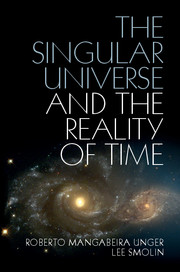Book contents
- Frontmatter
- Contents
- The nature and scope of this work
- Part I Roberto Mangabeira Unger
- 1 The science of the one universe in time
- 2 The context and consequences of the argument
- 3 The singular existence of the universe
- 4 The inclusive reality of time
- 5 The mutability of the laws of nature
- 6 The selective realism of mathematics
- Part II Lee Smolin
- Acknowledgments
- References
- A note concerning disagreements between our views
- Index
5 - The mutability of the laws of nature
Published online by Cambridge University Press: 05 December 2014
- Frontmatter
- Contents
- The nature and scope of this work
- Part I Roberto Mangabeira Unger
- 1 The science of the one universe in time
- 2 The context and consequences of the argument
- 3 The singular existence of the universe
- 4 The inclusive reality of time
- 5 The mutability of the laws of nature
- 6 The selective realism of mathematics
- Part II Lee Smolin
- Acknowledgments
- References
- A note concerning disagreements between our views
- Index
Summary
Changing laws
Do the laws of nature change? Many philosophers and scientists have claimed that the immutability of the laws of nature is a premise of the work of science. In pressing this claim, they reify a particular idea of science: an idea that takes the central tradition of physics, from Newton to Einstein, as the model of science. For it is only in this tradition that the notion of changeless laws of nature has had a secure place. Nevertheless, only very few physicists, Dirac and Feynman first among them, have explicitly questioned the immutability of the laws of nature and suggested that they must have been different in the early universe.
There are other branches of science in which the notion of unchanging laws does not immediately occur to a practicing scientist unless he is anxious to show how his scientific practice can be made to conform – or to appear to conform – to the supposed master science, modern physics. We commonly think of the explanatory force of the regularities of natural evolution that are enshrined in the contemporary Darwinian synthesis as having developed together with life. This joint transformation of the phenomena and of the regularities that they exhibit is not a one-time phenomenon; it keeps happening. For example, our account of the workings of the Mendelian mechanisms in the course of evolution is modified by the arrival of sexual reproduction.
- Type
- Chapter
- Information
- The Singular Universe and the Reality of TimeA Proposal in Natural Philosophy, pp. 259 - 301Publisher: Cambridge University PressPrint publication year: 2014

